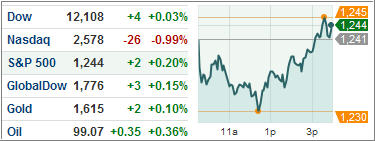Not a lot of movers and shakers in the market today as the S&P 500 finished up only 0.19%.
While most of the indexes hovered near zero, tech got pretty battered as the NASDAQ fell 0.99% based on Oracle’s weak earnings, having a domino effect on other tech stocks such as IBM.
Although I hesitate to say we’re in risk-off mode, the VIX reached its lowest level since late July, ending just below 22. On one hand, this can be interpreted as a positive sign to gain an entry point into selective equities. Nevertheless, I believe markets will start swinging more again once the holiday season is over and volume picks up again.
Trying to catalyze credit flow, the ECB gave over $645 billion in long-term loans to European banks. With liquidity drying up and banks hesitant to lend, these loans will hopefully provide the fuel to get the European economy up and running again. If anything, we’re seeing evidence of a financial system hampered by contagion and starved for funds.
Italy’s outlook became grimmer as it announced a 0.2% drop in third quarter GDP growth. Given that more austerity is on the horizon, Italy is set for a long period of economic growing pains. With a never-ending spate of bad news, I bet red wine sales are up though.
Even if the PIIGS can stave off expulsion from the Eurozone, there’s no doubt that they are descending into economic stagnation. While we focus on forces impacting financial markets such as bond yields and the like, the exodus of PIIGS citizens foreshadows an anemic real economy down the road.
Meanwhile, the UK is considering more quantitative easing to spur growth. Although the UK wishes not to be a part of the EU Treaty, it’s still prone to the harmful effects of the EU debt crisis.
As U.S. politicians are unable to agree on budget reduction measures, Fitch has now threatened to drop the U.S.’s AAA rating due to its spiraling debt load. Adding more negativity for the U.S., after yesterday’s encouraging housing data, there was a 14% downward revision in existing home sales since 2007, worsening the already ugly housing situation.
And in Asia, central bankers have reduced Japan’s growth forecast as exports have fallen in part due to a strong Yen.
In the last couple months, we’ve seen brief rallies in equity ETFs where the windows of opportunity are often very small. However, trying to capitalize on this can be a fruitless endeavor, warranting the use of bond ETFs to guard against those untimely dips.
Contact Ulli

Comments 3
if you are waiting for europe to heal, you are waiting for godot.
There has been so much talk about currency/dollar collapse and a global depression occurring very soon. Most are predicting hyper-inflation and say gold ( and a few other investments ) may be the best store of wealth, and the dollar and bonds are going to crash with most everything else. They urge buying as much gold as you can as soon as you can. Then there are others who are predicting massive deflation. They say gold is going to crash with other commodities and the dollar is going to remain the safe haven. Large cyclical factors not the least of which is the aging baby-boom generation is driving a very long period of slow growth and deflation. Obviously, the choices one makes believing in one theory would be disastrous if the other turned out to be true.
I wonder if you agree with either or neither and have any thoughts of your own? Does your ETF strategy have the ability to prepare us for and see us through a depression? I don’t want to wait to the last minute to do something to prepare for the worst only to find out I have waited too long.
Mark,
There are plenty of opinions; that’s for sure. It’s also a given that nobody can predict the future, so these are all wild or educated guesses. To me, it all boils down to trends. As we go forward, the simplest way to identify whether an asset class is worthwhile considering as an investment is by looking at my weekly Cutline reports, which are published every Monday morning.
They clearly identify if an ETF/mutual fund is in an uptrend or not. While that does not guarantee a successful investment outcome, it enhances your odds of being able to better evaluate as to which ETFs are rising and which ones are falling. No matter whether we’ll have a bull market, a bear market, a recession or depression, trends tend to tell you what’s real amidst the onslaught of news and data, which always seem to cloud the clear vision.
Ulli…